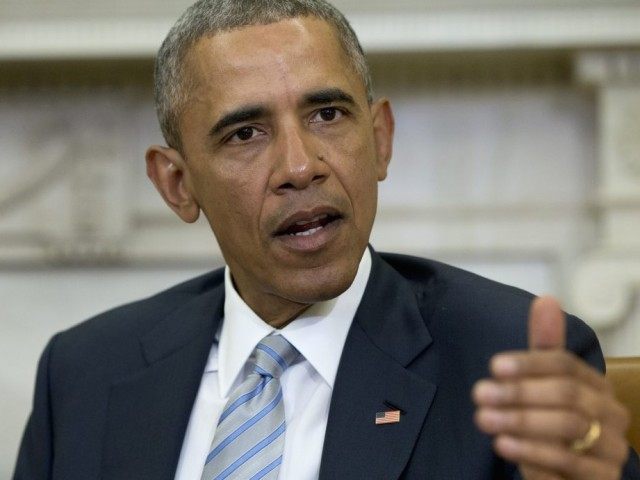President Obama has unveiled his proposal to close the Guantánamo Bay detention facility, transferring the remaining terrorist detainees to mainland U.S. facilities at a cost of some $475 million.
The Baltimore Sun anticipates congressional skepticism for the plan, which claims it can recover the construction and transfer costs by saving up to $180 million per year over the cost of operating the Guantánamo facility.
“The plan provides few details, and may only further antagonize members of Congress who have repeatedly passed legislation banning any effort to move detainees to the U.S.,” writes the Sun, noting that House Armed Services chair Mac Thornberry (R-TX) had previously informed the President that only a highly detailed plan would be considered by his committee.
Administration officials insisted the plan was light on details because it is meant to “provide a starting point for a conversation with Congress,” as the Sun puts it, and more precise financial estimates will be provided later.
Today’s proposal broadly makes the Administration’s case by asserting that Gitmo is exceptionally expensive to run – about $445 million per year, with $225 million in repairs needed if it remains in operation – while the up-front cost of expanding existing facilities in the U.S. would be offset by much lower operation costs over the next three to five years.
CNN argues that because “current law prevents using funds to close the prison,” Pentagon planners could not “conduct as thorough a cost calculation as they otherwise might have.”
The officials who spoke to CNN gave a far lower estimate of annual savings than anonymous officials have delivered to other media outlets Tuesday morning, saying it might only save between $65 million and $85 million per year, at which pace it could take more like seven or eight years to recoup the initial costs.
Of course, there are more than financial concerns at stake. Congressional representatives for most of the states that might house these terrorist detainees have expressed opposition to relocation, citing security concerns. (Many of these detainees are linked to al-Qaeda, which has developed a distressing aptitude for conducting prison breaks.)
“The American people have a right to expect that the administration will be transparent and honest with them about the activities and associations of the terrorists who remain at Guantánamo,” declared Senator Kelly Ayotte (R-NH). “The administration’s refusal to do so only underscores the fact that closing Guantanamo will make Americans less safe.”
There are said to be 13 possible locations for relocating terrorist prisoners in the plan, including seven existing prison facilities and six military bases. The Baltimore Sun recalls Pentagon assessments from last year leaning toward the Centennial Correctional Facility in Colorado as a most suitable site for inmates who can never be released.
CNN recalls that Republican lawmakers “insisted upon language in two bills recently signed by Obama – the defense authorization and defense appropriations bills – that bars the transfer of Guantanamo detainees into the U.S.”
The Baltimore Sun notes that the Left’s often-repeated justification for closing Guantánamo Bay, that it has “long been a recruiting tool for militant groups and that holding extremists suspected of violent acts indefinitely without charges or trial sparks anger and dismay among U.S. allies,” is vigorously disputed by critics.
There has never been any empirical evidence that Guantánamo Bay is a key element of terrorist recruiting or jihadi propaganda, as even liberal “fact-check” sites have been forced to concede. By all accounts, there will still be a sizable number of prisoners held for life without a trial; it seems unlikely that jihadis angered by that state of affairs would feel better knowing they will be held in Colorado instead of Cuba.
Nevertheless, President Obama declared on Tuesday, “It’s been clear that the detention center at Guantánamo Bay does not advance our national security. It undermines our standing in the world.”
Polls have consistently shown substantial public opposition to closing the Guantánamo Bay facility. NBC News cites a Reuters poll from January 2015 showing opposition at 44 – 37 percent, while Rasmussen found opposition at 53 – 29 percent during the same time period. YouGov had support for keeping Gitmo open at 53-27 percent in July, with 40 – 25 percent disapproval for President Obama’s handling of the issue. Presumably the President’s highly public delivery of a Gitmo closing plan to Congress is intended to shift these poll numbers, perhaps a difficult challenge at a time of high concern about national security.

COMMENTS
Please let us know if you're having issues with commenting.